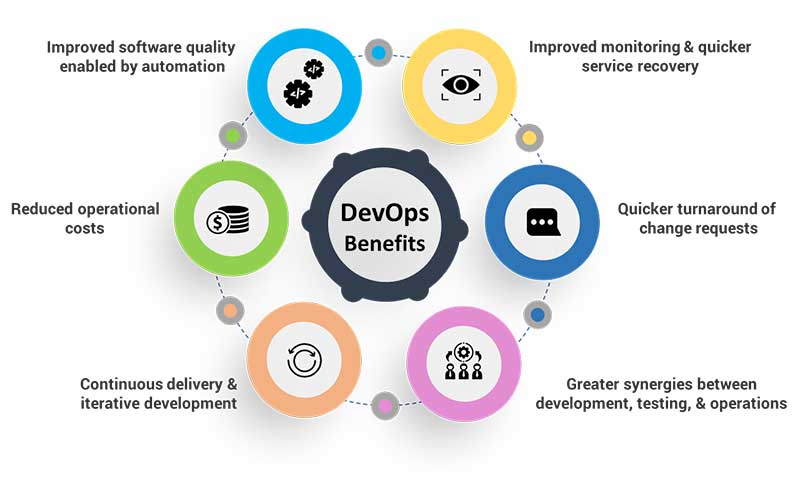How DevOps would benefits for IT operations?
Limited Time Offer!
For Less Than the Cost of a Starbucks Coffee, Access All DevOpsSchool Videos on YouTube Unlimitedly.
Master DevOps, SRE, DevSecOps Skills!

DevOps, a fusion of “Development” and “Operations,” represents a cultural and professional movement that emphasizes collaboration, communication, and integration among all stakeholders involved in the development, operations, and delivery of software. By fostering a culture of collaboration, automation, and continuous improvement, DevOps seeks to shorten the software development lifecycle while delivering high-quality software. This methodology is characterized by a continuous cycle of integration, delivery, and deployment, which helps organizations adapt quickly to changing market demands and improve overall efficiency.
Key Benefits of DevOps for IT Operations

1. Enhanced Collaboration and Communication
One of the most significant benefits of DevOps is breaking down silos between development and operations teams. By fostering a collaborative environment, DevOps enables teams to work in harmony towards shared objectives.
- Shared Responsibility: Developers and operations teams share accountability for system performance and reliability.
- Improved Team Dynamics: Regular communication ensures all teams are aligned, reducing misunderstandings.
- Faster Problem Resolution: Teams can quickly identify and address issues, minimizing downtime and disruptions.
2. Accelerated Software Delivery
In today’s competitive market, the ability to deliver software quickly and efficiently is crucial. DevOps practices like Continuous Integration (CI) and Continuous Delivery (CD) ensure rapid deployment without compromising quality.
- Shorter Development Cycles: Automation and streamlined workflows reduce the time taken to release new features.
- Frequent Releases: Smaller, incremental updates are delivered more frequently, keeping systems up-to-date.
- Rapid Feedback Loops: Teams can gather and act on user feedback in near real-time.
3. Improved Quality and Reliability
DevOps emphasizes quality at every stage of the development lifecycle. Automated testing and continuous monitoring help maintain high standards.
- Automated Testing: Identifies bugs early in the development process, reducing the cost and effort of fixing issues later.
- Continuous Monitoring: Real-time insights into system performance help teams detect anomalies before they become significant issues.
- Stable Releases: Rigorous testing ensures that releases are stable and reliable.
4. Increased Efficiency Through Automation
Automation is a cornerstone of DevOps, enabling IT operations to achieve higher efficiency and consistency.
- Reduced Manual Effort: Automating repetitive tasks like testing, deployment, and monitoring frees up teams to focus on more strategic activities.
- Consistent Environments: Tools like Infrastructure as Code (IaC) ensure that development, testing, and production environments are identical, reducing configuration errors.
- Faster Onboarding: New team members can quickly understand and contribute to automated workflows.
5. Enhanced Security with DevSecOps
Security is integral to DevOps, often referred to as DevSecOps. Integrating security practices into the development lifecycle ensures robust and compliant systems.
- Proactive Security Measures: Security vulnerabilities are identified and addressed during development rather than after deployment.
- Continuous Compliance: Automated checks ensure systems adhere to regulatory standards and policies.
- Minimized Risk: Early detection of threats reduces the potential impact on operations.
6. Scalability and Flexibility
Modern IT operations require systems that can scale and adapt quickly. DevOps provides the tools and practices to achieve this.
- Dynamic Scaling: Systems can automatically adjust resources based on demand.
- Infrastructure as Code (IaC): Simplifies managing and scaling infrastructure.
- Hybrid and Multi-Cloud Support: DevOps practices make it easier to operate across diverse environments.
7. Continuous Improvement and Innovation
DevOps is rooted in the principle of continuous improvement, enabling teams to refine processes and deliver better products.
- Feedback-Driven Development: Regular feedback loops help teams learn and improve.
- Encouraging Experimentation: A fail-fast mindset encourages innovation while mitigating risks.
- Kaizen Approach: Continuous, incremental improvements enhance efficiency and outcomes.
8. Cost Optimization
DevOps practices lead to better resource utilization and reduced operational costs.
- Optimized Workflows: Automation eliminates inefficiencies in development and operations.
- Resource Management: Scalable systems ensure resources are used efficiently, reducing waste.
- Lower Downtime: Proactive monitoring and quick issue resolution minimize costly outages.
9. Better Customer Experience
By delivering high-quality software faster, DevOps enhances the end-user experience.
- Frequent Updates: Users benefit from regular updates and new features.
- Improved Reliability: Robust systems lead to fewer disruptions.
- Responsive Service: Faster feedback loops allow companies to address user concerns promptly.

How to Implement DevOps in IT Operations
Transitioning to DevOps requires careful planning and execution. Here’s a step-by-step guide:
- Foster a Collaborative Culture: Break down silos and encourage teamwork.
- Adopt CI/CD Practices: Streamline development and deployment processes.
- Invest in Automation Tools: Leverage tools like Jenkins, Docker, and Kubernetes.
- Implement Infrastructure as Code (IaC): Use tools like Terraform or Ansible.
- Integrate Security: Make security an integral part of the development lifecycle.
- Monitor Continuously: Use monitoring tools like Prometheus or Nagios to maintain system health.
- Train Teams: Provide ongoing training to ensure teams are skilled in DevOps practices.